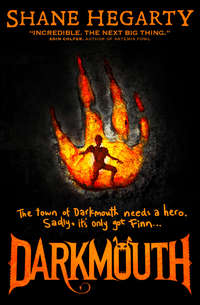
Darkmouth
“Ta-da!” he said with a flourish he immediately felt silly about.
There was the clunk of a lock opening. With a little effort, he pushed the door open with his shoulder and stood back so Emmie could enter first. She stepped through, peering into the deep dark that greeted her.
Finn flicked a switch and a single bulb flickered just over their heads. Then light raced along the ceiling away from them, illuminating bulb after bulb after bulb. It was not a room at all. It most certainly was not a cupboard.
“This corridor,” Emmie gasped. “It’s huge! It must take up a few of the houses next door.”
Finn gave her a look, and she frowned for a moment, then gasped.
“The whole street? Your house takes up the whole street? That’s insane!” She gave him a shove in delighted disbelief.
The hallway was narrow with a high ceiling. The lights bathed the faded brickwork, which changed in colour and texture every few metres, the street having been built one house at a time over many, many years. The entrance appeared to be the oldest part. “We just call it the Long Hall. It was like this long before I was even born,” explained Finn. “Our ancestors started off with our house where we still live, and over the years took over one house at a time, until we were the only ones here.”
Running along the length of the corridor’s right-hand side were closed doors, some wooden, some steel, and each marked with letters and numbers that would mean nothing to anyone who wasn’t a member of the family: the first was T4; the second E1; the third S3.
The left wall was lined with large portraits, some reaching from floor to ceiling. The first few were dark and faded. In them, the people wore metal armour topped off with shoulder spikes, helmets with antlers attached, and they carried basic but fierce weapons: double-bladed swords, nets rimmed with steel, shields studded with blades.
As Finn and Emmie moved slowly along the great corridor, the armour in the portraits grew increasingly modern and sleek, and the weapons changed from sharp instruments to guns.
The paintings were mostly of men, but women began to feature as the paintings became more obviously recent. Each had a nameplate: Sean the Brave, Hugh the Stone-Headed, Ragnall Iron Trousers, Aisling the Powerful, Conor Red Skull, William the Surprised, Rachel the Stubborn, Rory the Esteemed.
Each bore a striking resemblance to Finn.
“My ancestors,” he said.
Emmie looked at the portraits. “Weird names.”
“We don’t get a surname at birth,” Finn explained. “We gain one. Each of these people is named because of something they did or their personality.”
“What’s yours then?” asked Emmie.
“I don’t have one yet.”
“So you’re just Finn?”
“Until I get my Legend Hunter name. Everyone at school thinks it’s a bit strange not to have a surname, but it would feel strange to me to have one. Finn Smith, Legend Hunter. Doesn’t quite work, does it?”
“Suppose not,” said Emmie quietly.
It occurred to Finn that he had never asked her an obvious question. “What’s your surname anyway?”
“Er, Smith.”
“Oh.” Finn felt heat flush through his face.
“Don’t worry about it. I can blame my dad for that one,” said Emmie, who didn’t seem too bothered and was already scanning paragraphs of text framed beneath each painting.
She read from one.
“Conor Red Skull, Darkmouth, Ireland. Active during the late seventeenth century, he once went four days without sleep while tracking down and slaying two dozen Legends who had entered through three simultaneous gateways. It is said that he was so stained with blood it never properly washed off his skin. He earned his Hunter name due to his inability to spend any time in the sun without getting burned.”
“Each portrait has an entry like that,” said Finn. “It’s taken from The Most Great Lives, which is this book we have to read while training to become a Legend Hunter. Books actually. There’s a lot of them and they’re about all of the Legend Hunters throughout history.”
“Does that mean you’ll be in a book one day?”
“Um. Yeah, maybe. When I become a proper Legend Hunter,” said Finn.
“Cool.”
Finn flushed again, the heat prickling his face. Emmie moved on, eventually stopping at the second to last portrait. It was of a man who looked about as furious as it was possible to get. Across his lap was a simple rifle and behind him was a row of shelves lined with jars, whose labels the artist hadn’t bothered to add detail to. On a small table beside him was a miniature tree, leaning away from him at a sharp angle.
The nameplate on the frame read Gerald the Disappointed and the text below was particularly lengthy, going into some detail about the many adventures of his early life, including his rescue of a family of Legend Hunters hemmed in on the Scottish island of Iona; the year in which he staved off 154 Legend invasions of Darkmouth; his world-renowned bonsai collection; and how he once single-handedly felled a massive three-headed Cerberus, armed with just a single rock (“… albeit a very pointy rock,” The Most Great Lives clarified).
Finn hovered patiently while Emmie read. Finally, she spoke. “Nice nickname. Suits the face.”
“That was my great-grandfather,” replied Finn. “I never knew him.”
“Bet he was a barrel of laughs.”
“He trained my father. My dad says he was pretty fierce.”
“Why did he have to train your father? What happened to your grandfather?”
Finn gestured towards the last portrait. This man wore armour but no helmet, and was the only one in any of the portraits who was not holding a weapon. Instead, he was surrounded by scientific instruments and scraps of paper. He didn’t look particularly confident or aggressive. His chin wasn’t held high and his eyes were pointed down, as if he was meek or maybe even a little afraid.
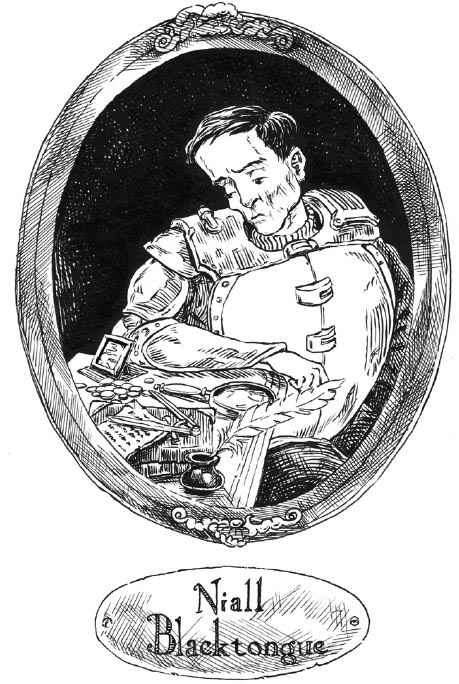
“That was my granddad, my dad’s father.”
“Niall Blacktongue! Excellent name.”
“Not really,” said Finn, downbeat.
Emmie read the entry aloud. “Niall Blacktongue was the first Legend Hunter to try and talk to the Legends, to reason with them and attempt to understand why they wanted to come into this world. He died. No one likes to talk about it.”
That was it. Nothing else.
“I don’t get it. What happened to him?” asked Emmie.
“He died,” Finn responded haltingly. “No one likes to talk about it.”
There were two empty frames at the end of the row, with nameplates ready and waiting, but nothing engraved on them just yet.
“Who are those for?” asked Emmie.
“They are to remind us of our responsibilities to all of the Hunters who have gone before, all of these people along the wall. You only get a portrait when you’ve passed the role of Legend Hunter to someone else or if you, eh, well, die.”
“Wow, that must be pretty scary.”
“Well, you know, it’s our way of life, I suppose. That first empty frame’s for my dad.”
“What’s your dad’s nickname then?”
Finn paused before answering. “Hugo the, erm, Great.”
“The Great?”
“Yeah,” Finn mumbled. “He did a couple of things when he was younger. Kind of great sorts of things.”
“What, like fighting Legends?”
“That. And more. He never shuts up about it.”
“So, when will you get your nickname?” asked Emmie.
Finn’s hands were rammed into his pockets, his shoulders tight. “I have to do a thing called a Completion first. It’s a big ceremony.”
“When?”
Finn didn’t respond, but instead walked on towards the very end of the long corridor, the wall now empty of portraits on one side, but with doors still lining the other (T1, A4). Emmie tried one, but it was locked. At the end of the corridor was a large steel door with a wooden sign that read ‘Library’. Finn hesitated for a moment and turned to head back the way they’d come. “And this concludes our tour,” he said, with forced jauntiness.
“What’s in there?” asked Emmie, still standing at the library door.
“Nothing much,” said Finn unconvincingly. “Let’s go and see what food’s in the kitchen. I’m starving.”
Emmie hovered there a couple of moments longer. Finn watched her, listening to the noises from inside. The faint sounds of feet moving around, the squeak of a chair. She moved a little closer. From deep within came what sounded like a shriek.
“Come on. Race you to the kitchen,” said Finn.
Emmie hurried after him.
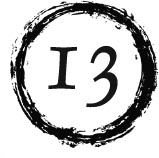
“Hit me.”
Finn punched his father in the face.
“Hit me again.”
He hit him again.
“Put some anger into it.”
Finn had anger in reserve, but he had to drill deep below his exhaustion to get to it. He concentrated hard, summoning it from the depths, and swung again. His father hardly flinched. Instead, he pulled off his soft padded headgear.
“Come on, Finn, this is only training. When I was your age, I was—”
“—already fighting Legends five times my size,” Finn panted. “You’ve mentioned it once or twice before.”
He dropped his tired arms. His father gave him a dig to the chest.
“Hey!” Finn protested.
“Don’t drop your guard. Now kick me. Aim for the crotch.”
Every Friday night, one of the rooms off the long corridor would host Finn’s often futile attempts to learn how to roll over and get up again; or to shoot at a target; or to leap; or to dodge; or to leap while dodging. This room was T2, a training room bare but for the soft mats on its floor, a mirror running the length of one wall and a box of simple gym equipment containing various items of padded gear that allowed Finn to hit his father wherever he was ordered to.
He stretched out and kicked. His father grabbed his leg and wouldn’t let go, so that Finn was left hopping on one foot, completely at his father’s mercy.
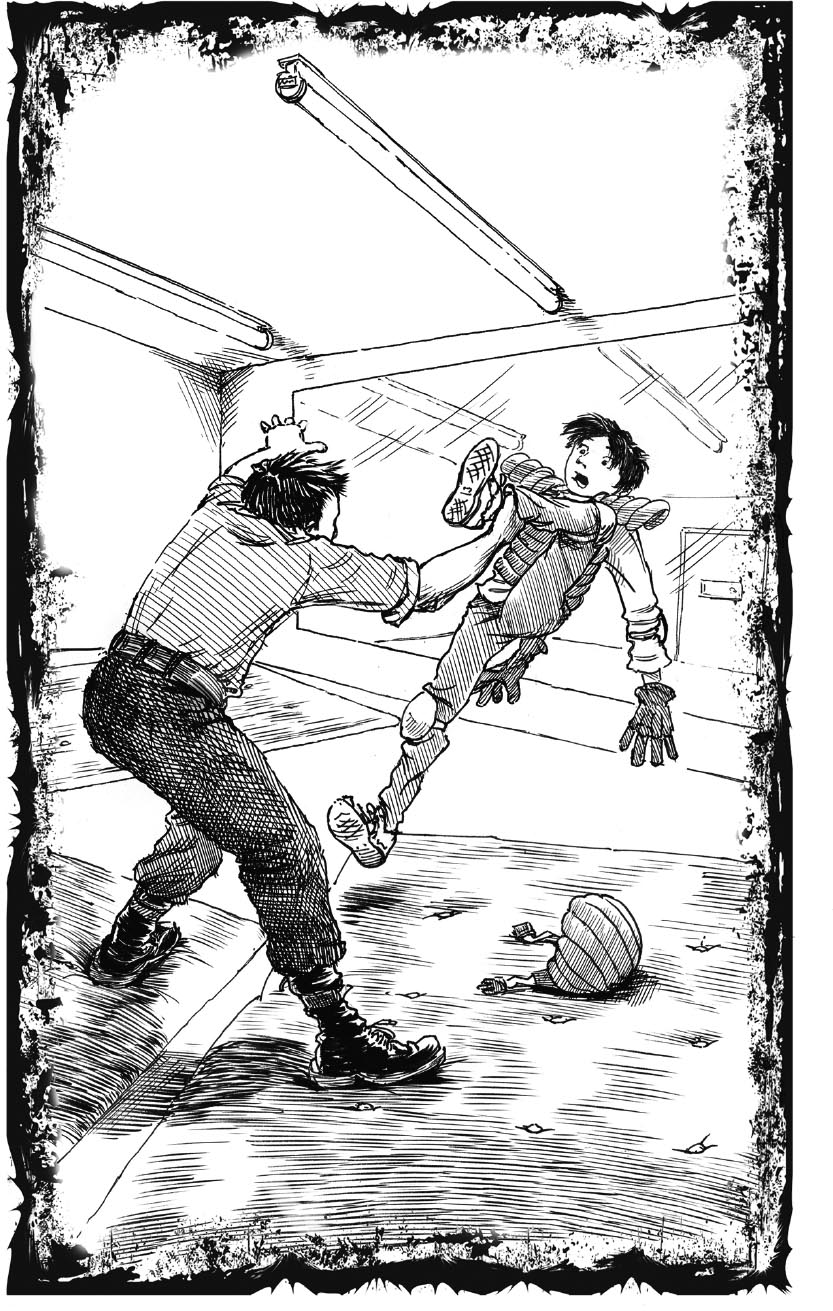
“I’ve seen ducks kick harder than that,” said his dad.
Finn had been training since he was very young, so it wasn’t that he couldn’t do any of these things. It was worse: he could almost do most of them. He could half roll, and just about jump to his feet. He could kind of shoot, nearly leap, more or less punch and semi-dodge. He had strengths; it just happened that they were usually closely followed by his weaknesses.
“Let’s try the Wrigley Manoeuvre, Finn. It’s a simple way of not just avoiding an onrushing Legend, but of turning defence into offence.”
“That’s the same guy who ended up being known as Wrigley the Headless, right?”
“Yes, and that’s why we have to make sure to do it right. Now take this seriously, Finn. It might save your life.”
His father demonstrated the move, darting across the room, then sliding and returning to his feet, facing Finn, with his hands raised in an attack position. “Now you try it.”
Finn followed his dad’s lead, but compared to him he had the dexterity of a giraffe on ice. “I see what you’re doing. I get it,” he protested, breathing hard. “I’m just tired now.”
“Twelve-year-olds don’t get tired. When I was twelve …”
“That must have been some year. Did you save anything for when you were thirteen?”
“Look, Finn. In the classroom, you’ve the potential to be a very good Legend Hunter—”
“Well, bring the Legends to the classroom and I can tackle them there,” said Finn.
“If you were as quick with your hands as you are with your mouth, this wouldn’t be so difficult,” his father replied.
Finn sat on the ground, breathing hard.
“Stay fresh,” said his dad. “You can read a couple of entries in The Most Great Lives when we’re done here.”
“Ah, Dad, really?”
“You’ll be in there yourself some day.”
“So you keep saying. There won’t be much to say about me,” said Finn.
“That hasn’t stopped them before. Besides, they’re desperate for you to come through. No Completions, and no true Legend Hunter in years, mean no new edition of the book. No new edition, no profits. They’re badly in need of an update.”
Finn was well aware of this already, thanks to the publisher’s repeated letters.
“Looking forward to your Completion,” Plurimus, Magesterius, Fortimus & Murphy wrote. “How’s the training going?” they asked. “We don’t mean to rush you, but …” and so on. Finn spent a lot of time trying not to think about the queue of people lining up to be disappointed if he didn’t Complete. Nevertheless, his conversation with Emmie had reminded him he wouldn’t be the first family problem.
“Dad, what really happened to Granddad Niall?”
“No one likes to talk about it, you know that.”
“I want to talk about it.”
“And I don’t. Now quit stalling and get up.”
Finn had almost got his breath back, but kept up the heavy panting to get a couple more moments’ rest.
“Maybe I won’t fight them when my time comes,” he said.
“What?”
“Maybe it’s the fighting that keeps the Legends coming, you know,” said Finn, a clamminess rising in him as he realised he was treading on thin ice. “Maybe talking to them isn’t such a bad idea.”
“Which bit of the ‘no one likes to talk about it’ is hard for you to understand?”
“Maybe we can learn something from it.”
His dad squatted down to stare directly at Finn, holding his gaze until Finn’s eyes began to want to jump out of their sockets and run away. Finally, his father spoke. “What my father did is not something I will ever be allowed to forget, no matter how hard I try. That’s all the lesson we need to learn.” He offered Finn a hand up. “Now let’s get fighting again.”
“Is this going to be needed, though?” asked Finn. “The gateways are dying out. They’ll be gone from here too eventually. Besides, we have Desiccators. Why do I need to learn this stuff?”
“You might have noticed that the Legends aren’t gone yet.”
“Then why do they keep attacking here and nowhere else?”
“I don’t know. What do you think?”
Finn took a moment to ponder this. “I think I’ve scared the bigger ones away.”
His father grinned at that, held out a hand and helped Finn to his feet. Then he jumped back. “OK, buster, wrestle me.”
Finn’s sigh of annoyance was lost in the clatter of an alarm rattling through the building. That noise had been the soundtrack to Finn’s life – the signal that a gateway had opened somewhere in Darkmouth.
“Excellent,” said his father, perking up immediately. “Who needs training when we have a live Legend to help us out? Besides, if we get into trouble, you can just give the Legend the look you’re giving me now. That’ll scare it.”
Finn bit hard on his lower lip.
His father grinned. “Yep, that’s the one.”
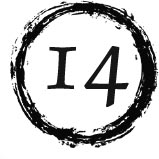
Broonie walked through the gate and emerged into a world of rain.
What he noticed first was not the scenery, but the air. It had a purity that was invigorating. At least it had a purity once he sniffed his way past the many impurities that were layered over it: fatty foods, burnt fuels, seaweed, decaying flowers, all overlaid by tons of perfume-doused sweat. It carried in the breeze and through the light rain.
But, underneath all that, the air was so fresh that he wanted to drink it.
Everywhere he looked there was a vibrancy that he had never experienced. Each colour was divided into shade upon shade – even the greys exploded across a spectrum.
This was the Promised World. This was what centuries of war had been waged over. He understood it now.
He was on a Darkmouth street. So orderly, he thought. Flowers growing from baskets in the air: novel. Numbers on doors: curious. The ground is painted with rectangles and vehicles are abandoned in them. Odd.
Broonie felt grubby in his dull rags crusted with his own blood. He saw that he was covered in a fine layer of dust that seemed resistant to the rain. Instead, it shed from him as he nervously shuffled on the spot, trying to decide what he had to do next. He had been told his mission. He still didn’t understand exactly what it was.
“When you see them, you can attack,” the Fomorians had said.
“Attack?”
“Attack.”
“Shouldn’t I take a bigger weapon with me?” he had asked, holding up the small knife they had given him.
“Your best weapon is your ingenuity,” they told him.
“While I appreciate the compliment, I’m not sure it will be entirely sufficient to—”
At which point a boot kicked him through the rippling gateway.
There was an incessant ache where his finger had been removed and clumsily replaced with a new digit made of crystal. It already felt loose at the knuckle. Even in his disbelief and pain, he was annoyed at the Fomorians’ shoddy workmanship.
An older human in a headscarf crossed his path, pulling some kind of square bag filled with provisions. When she saw him, she screamed and scuttled away, leaving her bag to spill at his feet. Broonie rummaged through its contents. He was desperately hungry, and slurped from a carton of milk, then bit into an egg and sucked its contents. They tasted so fresh he shuddered in delight. He rifled through the bag some more and recoiled. Inside a clear package was meat. Bloody. Sliced neatly.
These people must be more vicious than it is taught. Even the elders carry the raw parts of their prey.
It was time to run.
He struggled through Darkmouth’s maze of dead ends and blind alleys, continually failing to find a clear path.
Turning on to a wide street, he ran into a bustle of humans moving through the town. One noticed him and his shriek alerted the others. A small hairy animal at the end of a leash went wild, straining and snarling until Broonie thrust his knife at it, pricking the creature in the paw so that it squealed and withdrew, bleeding.
Its owner kicked at him and Broonie stabbed impulsively at him too, nicking his ankle, before jumping backwards on to the road where there was a horrible squeal of machinery as an oncoming metal vehicle braked only an ear-hair’s width from his face.
Adrenalin coursing through his raised black veins, Broonie darted through the nearest doorway to crouch inside its large window while he tried to figure out an escape route. Outside, the scene was chaotic. Some ran off straight away, while others stopped first to stare at him with mounting disgust before following the others.
Broonie became aware of something above him. And behind him. And around him.
Carcasses, stripped down to their flesh, hung on sharp hooks. Torn and cut and placed on display. Ribs, livers, tongues, all manner of sliced hunks of animals were neatly laid out behind a glass compartment. Broonie guessed they must be the fresh kills of the fat human currently standing behind the glass counter in a bloodstained overall, with one hand on a large cleaver and the other on a half-sliced body laid out on a table beside him.
If Broonie had opened his eyes any wider, they would have popped out and rolled across the floor to the butcher’s feet.
On the street, there was the squeal of metal, a great roar and another vehicle arrived through the crowd of humans that was heading in the opposite direction. A figure emerged from it, tall and imposing, fully armoured and wielding a gun.
Broonie immediately knew who this was. The Legend Hunter.
“A Hogboon,” he heard the Hunter say clearly. “Hardly a challenge, especially if it’s carrying little more than an apple peeler.”
Broonie sprang at the butcher, wincing at the blood smeared on his clothes, and wrapped himself tightly round his head, grasping firmly at the man’s face until he dropped the cleaver with a clang. Broonie then slid down on to the human’s shoulders, holding his bloodied knife to the butcher’s neck as the Legend Hunter burst into the shop, gun raised.
“Hugo …” whimpered the butcher.
“Don’t worry, Leo, we’ll soon have this sorted.”
From his dry throat, Broonie summoned the best rasp he could. “You’re a cruel species. Let me go or I will show you how cruel I can be too.”
“You want me to drop this Desiccator?”
“Now,” said Broonie, pulling tighter on the knife. His fear of having to carry through with his threat was outweighed by the thought of his insides hanging in this window while his outsides spent the rest of eternity as a comfortable pair of shoes.
Конец ознакомительного фрагмента.
Текст предоставлен ООО «ЛитРес».
Прочитайте эту книгу целиком, купив полную легальную версию на ЛитРес.
Безопасно оплатить книгу можно банковской картой Visa, MasterCard, Maestro, со счета мобильного телефона, с платежного терминала, в салоне МТС или Связной, через PayPal, WebMoney, Яндекс.Деньги, QIWI Кошелек, бонусными картами или другим удобным Вам способом.
Вы ознакомились с фрагментом книги.
Для бесплатного чтения открыта только часть текста.
Приобретайте полный текст книги у нашего партнера:
Полная версия книги
